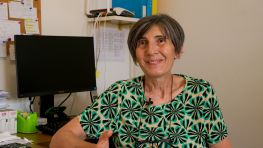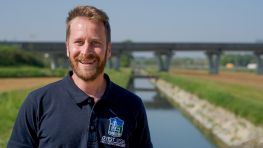 Marinella Ferrari
Marinella Ferrari Andrea Ferrarotti
Passion and Preservation: Andrea Ferrarotti and Water Care between Trino and Palazzolo
Andrea Ferrarotti, born in 1985, has been working for six years in the Fontanetto Po department, part of the Est Sesia water management system. After an initial career in sales, he pursued his passion for the environment and water, a factor that has always accompanied him in his personal and professional life. Today, he is a department assistant and manages the management and distribution of irrigation water in the area between Trino, Palazzolo, and Livorno Ferraris.
Ferrarotti describes in detail the functioning of the water network he coordinates: from the main canals (Magrelli, Riva, Acqua Nera) to the reservoirs, hydroelectric plants, and irrigation outlets. His work includes flow regulation, routine and extraordinary maintenance, constant communication with agricultural users, and emergency management related to droughts or floods.
The interview highlights the importance of human presence on the ground, even in an age of automation and remote control. Andrea emphasizes how firsthand knowledge of the local area, the ability to read the water's signals, and the willingness to intervene even after hours are essential to maintaining the system's efficiency. Also central to his story is the relationship with nature, experienced with respect and a sense of belonging, and the denunciation of the environmental degradation caused by the waste that littered the canals.
Ferrarotti concludes by emphasizing how water is never wasted, but rather recovered and reused throughout the network, thanks to a continuous cycle system based on attention, dedication, and collaboration between institutions, consortia, and citizens.
Video table of contents
- In West Sesia for six years
- Trino Area, Fontanetto Ward: Magrelli Canal, Rive Canal, and Acqua Nera. Camera Canal
- Remote management and always being on call
- Drought management
- Water is not wasted, attempts to open the vents at night
- The Fontanetto Fountains and the Palazzolo Fighters: Water Rights
- Managing floods: Automatically and manually draining to avoid disasters
- Technological upgrades yes, but human presence is essential
- I feel like the irrigation network is my thing
- Measurement methods, modules, hydrometers, Cavour and Bazin models, formulas for backflow and free weirs
- It's nice to be surrounded by nature
- The waste collection system in the large canals protects the Consortium's equipment. There is no collection system in the smaller canals.
- The Water Carrier's Working Year and the Beauty of My Work
- Rice farming doesn't waste water, it uses it and gives it back
Interview information
Country: IT
Region: Piemonte
City: Palazzolo Vercellese
Andrea Ferrarotti
Date of birth: 03-05-1985
City: Torino
School: High school or Secondary
Profession: Other
Languages: italiano
Document by: Luca Ghiardo
Video by: Luca Ghiardo, Davide Porporato
Created: 08-04-2025
Questo video fa parte del seguente archivio
Rice stories
Rice stories
Food is a fundamental resource for man and his health, both through the supply of nutrients and the ability to embody traits of human culture that play a leading role in our well-being.
Over time, each territory has built original ways in which to relate to the fruits of its land, enriching them with rituals, symbolic meanings and culinary customs. Much of these relationships have been lost following the years of the economic boom, with the exodus from the countryside to urban centers, with the advent of agriculture for mass production and ultimately with the globalization of markets and the consequent impoverishment of the heritage of biodiversity and ethnodiversity.
The purpose of this archive is to collect evidence relating to the main rice production area in Europe, that is the Po Valley, and to investigate, through the analysis of textual sources and testimonies collected in the field, both what survives of this heritage, and the ways in which which has evolved and reached us, paying particular attention to the explicit and implicit links that bind food and health.






